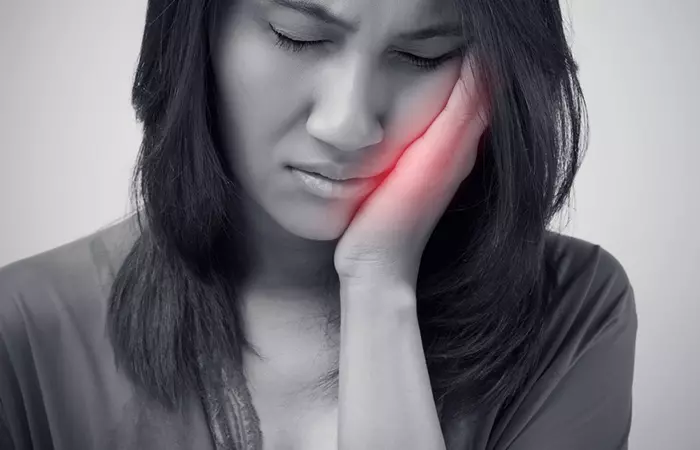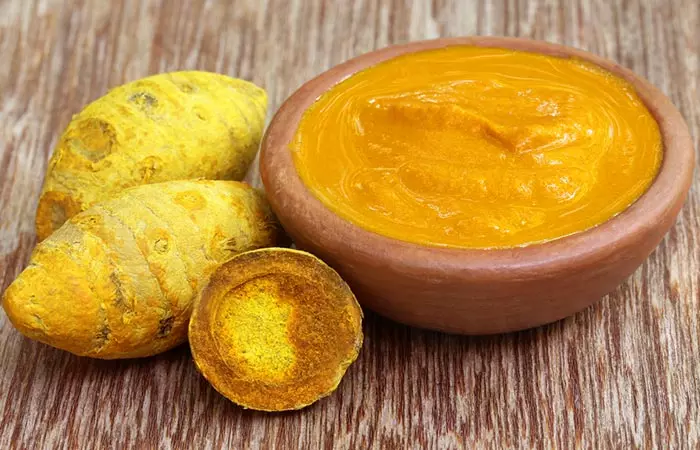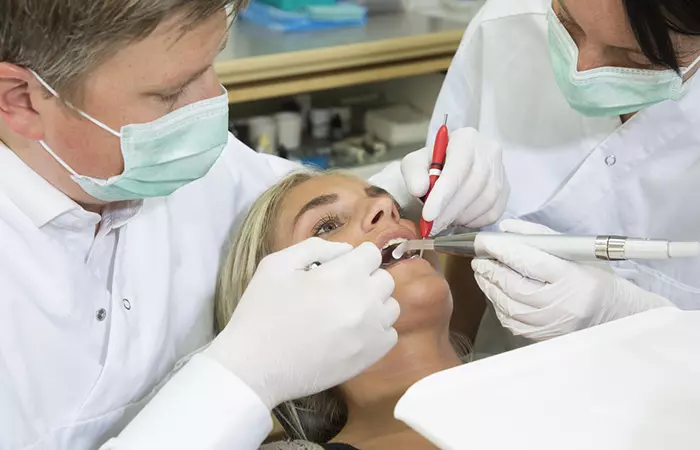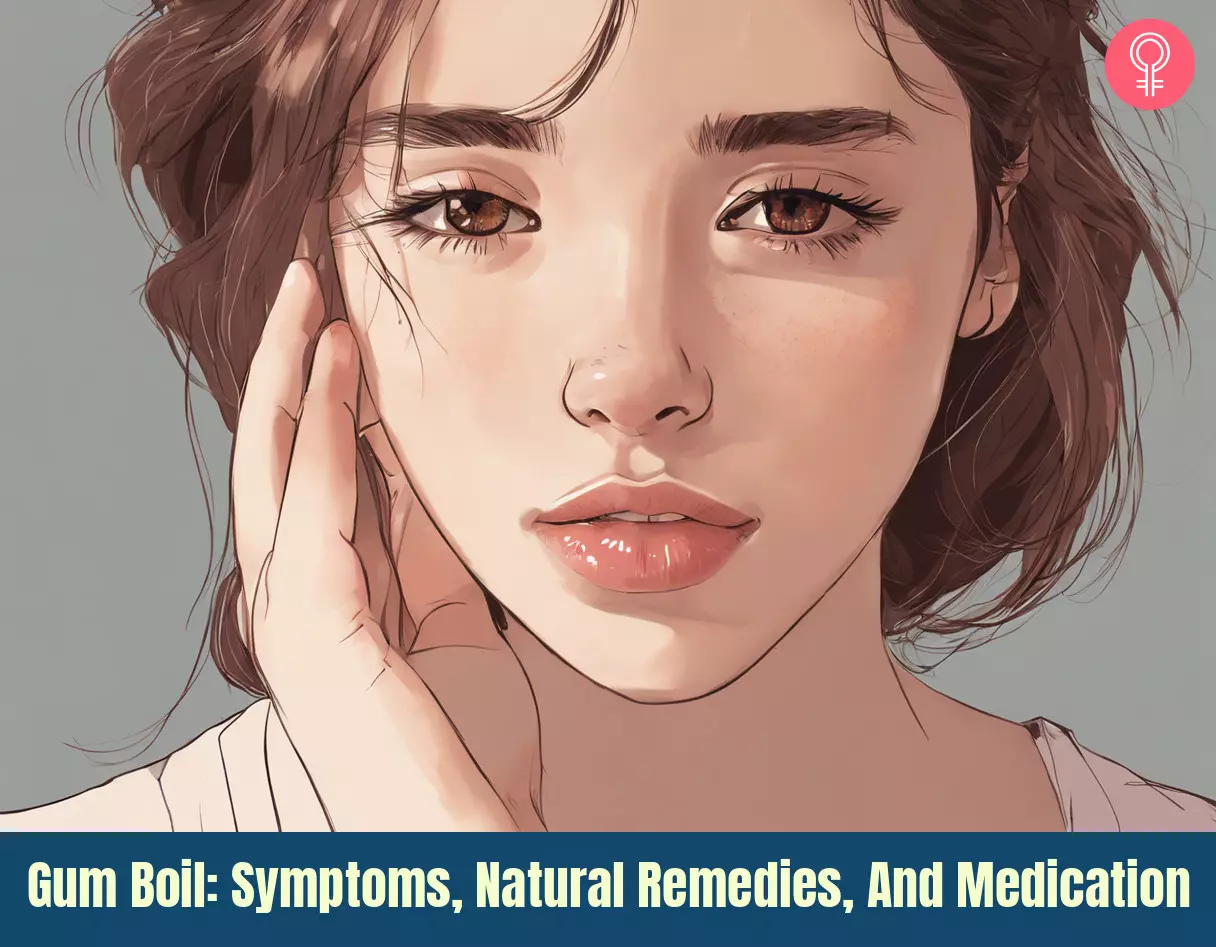Periodontal Abscess –A type of abscess characterized by collection of pus inside the gum tissue called the periodontal pocket. Periodontal abscess is one of the most common forms of boils that require a trip to the dentist every year (2). Caused by gram-negative anaerobic bacteria, a recurrent untreated periodontal abscess may lead to oral cancer cell formation (3). Periapical Abscess– Caused by Streptococcusi A genus of parasitic gram-positive bacteria that causes dental infections, pneumonia, pharyngitis, cellulitis and other diseases. and Bacteroides species, these dental abscesses form at the root of the tooth (4). Due to the buildup of bacteria at the root, it results in tooth and bone pain.
While pain in your gum may be the first sign of a gum boil, it may be accompanied by a few other symptoms as well.
Symptoms Of A Gum Boil
The common symptoms of gum boil are (1), (5):
Swollen gums: The infection causes inflammation, making the gums swell as the body tries to fight the bacteria. Fever: The body raises its temperature to help fight off the infection, leading to a fever. Swollen lymph nodes: Lymph nodes swell as they work to filter out the bacteria from the infection. Sore And Tender Gums: The infected area becomes inflamed, causing pain and tenderness. Facial erythemai A skin condition that causes reddening of the skin in patches due to increased blood flow due to stress, injury or inflammation. – facial Erythemai : The infection can spread making parts of the face red and swollen. Trismusi A condition in which the jaw muscles suddenly and painfully contract and cause the mouth to be locked temporarily, or even permanently. The muscles near the infection can stiffen, making it hard to open the mouth. Dysphagiai Difficulty in swallowing due to dental or neurological problems or blockages in any part of the swallowing process. Swelling may spread to the throat, making it difficult to swallow. Discolored teeth: Nearby teeth may change color due to decay or reduced blood flow. Hoarse voice: If the infection spreads to the throat, it may cause a change in the voice. Drooling: Swelling makes swallowing harder, leading to extra saliva and drooling.
MsFoy, a blogger, shared their painful experience of gum boils. They said, “The roof of my mouth swelled to an astonishing size and shape, and everything hurt – my jaws, my tongue, my nose, my sinuses, my left eye, my head – and my neck became very stiff and I had difficulty swallowing (i).” These symptoms can have certain underlying causes. Learn more about them in the next section.
Causes Of Gum Boils
Here are some common causes of this condition (5):
Gum diseases (gingivitis or periodontitis) Tooth decay Trauma or injury Gum surgery Weak immunity Bacterial infection Poor oral hygiene Impacted teeth Dental procedures (extractions or root canals) Tobacco use
Identifying a gum boil is the first step towards treating it. Know more in the next section.
What Does A Gum Boil Look Like?
A gum boil appears as a swollen bump on the gums that are closer to a tooth. It is often red, pus-filled, and tender to touch. The size of the boil can range from a small pimple-like bump to a larger, more noticeable swelling. In the next section, we talk about a few gum boil remedies you can try at home to help alleviate the symptoms.
Home Care And Natural Remedies For Gum Boil
Following these simple home remedies may not only reduce the symptoms, but may even prevent you from developing gum boils in the future.
Good Oral Hygiene
Taking good care of your teeth can go a long way in keeping gum boils, tooth decay, and gum disease at bay. A few tips to follow:
Brush your teeth twice every day. Floss your teeth daily. Visit a dentist twice a year for a cleaning and checkup. Limit sugary drinks and foods.
Stop Smoking
Studies suggest that smoking has been associated with the development of gum disease. This is because smoking changes the human microflora in the teeth which may lead to the destruction of the tissue. Smoking may also reduce the effectiveness of the treatment for gum disease (6). Cutting off the habit of smoking and chewing tobacco may reduce the risk of gum disease and help your gum heal after treatment.
Gargle With Salt water
Salt is a natural antibacterial and disinfectant (7). Studies suggest that rinsing with salt water may help promote gum health and oral wound healing (8). You can mix 1 teaspoon of salt in 1 cup of lukewarm water. Gargle the mixture in your mouth for 30 seconds before spitting it out. Repeat this 2 to 3 times regularly.
Rinse Your Mouth With Hydrogen Peroxide Mouthwash
Hydrogen peroxide is widely used as an antimicrobial agent and may help fight against different types of bacteria and microbes (9). A 2011 review suggested that hydrogen peroxide mouthwash along with daily oral hygiene may be instrumental in reducing gingival inflammation in the long run (10). A study was conducted in 2017 to see the effectiveness of hydrogen peroxide on patients with moderate to severe periodontitisi A gum infection that causes damage to the soft tissues and bone that support the teeth and can lead to tooth loss. . The authors found that patients who had been given the hydrogen peroxide treatment exhibited fewer symptoms than the control group that did not receive the treatment (11). To make a hydrogen peroxide mouthwash, combine 1 part of hydrogen peroxide with 2 parts of water. Gargle with this mixture for 30 seconds before spitting out. Do this twice a day.
Turmeric Paste
Turmeric has been used for centuries to treat various medical conditions. According to a study, turmeric may help treat periodontal diseases and may reduce dental pain (12). Another study reported that curcumin, the active compound present in turmeric, may be instrumental in preventing gum disease (13). To make a paste, combine 1 teaspoon of turmeric with ½ teaspoon of salt and 1⁄2 teaspoon of mustard oil. Brush your teeth with this paste twice every day. Let it sit for 2 to 5 minutes and then thoroughly rinse your mouth with water.
Essential Oils
There are many essential oils that may inhibit antimicrobial activity. Research suggests that tea tree, thymei An aromatic herb that belongs to the mint family and yields a medicinal oil with anti-inflammatory and antimicrobial properties. , and peppermint oil may be as effective as a traditional antiseptic against oral microbes (14). To use essential oils for oral health, add 1 drop of essential oil to your mouthwash or regular toothpaste. For rinsing, you can mix 1 drop of essential oil with a quarter of water.
Medication And Dental Procedures
To treat gum boils properly and effectively, your dentist may recommend one or a combination of the following treatments:
Antibiotics – Since a bacterial infection is the cause of gum boils, administering antibiotics is the best way to kill the bacteria. Most of these boils form below the gumline where topical creams may not reach, antibiotics are the best way to treat them. However, they may cause side effects like stomach upset, allergies, or antibiotic resistance if not used properly. It is important to follow your dentist’s instructions to avoid these issues. Deep Cleaning – Gum disease and tooth decay are some of the common factors behind gum boils. Going for deep cleaning or scaling can remove plaques and heal the swollen gums. You may also try these home remedies for swollen gums for temporary relief. Drainage– In some cases, your dentist may drain the pus from the boil, relieving the pain and allowing faster healing. Surgical Procedures– If a person develops a boil at the root of the teeth (periapical abscess) due to tooth decay, a root canali A dental procedure to remove the infected pulp and clean the insides of a damaged or infected tooth to save it from further decay. is the way to treat the infection. If the infection has spread to the teeth, your dentist may surgically extract the teeth to prevent the tooth infection from spreading further.
It is always best to try and prevent a gum boil so it doesn’t wreck havoc on your dental health. Keep reading to learn more on how to avoid getting gum boils.
Prevention Of Gum Boils
Brushing your teeth twice a day and flossing regularly will help keep your gums healthy. Use a soft-bristled toothbrush to avoid irritating your gums. Schedule regular dental check-ups to catch any issues early. Use a mouthwash with antibacterial properties to prevent infections. Stay hydrated and follow a healthy diet to support overall oral health. Avoid smoking, as it can increase the risk of gum problems.
To Sum It Up
Gum boils are swollen, pus-filled growths on your gum that can cause soreness and pain. Food stuck in your teeth, gum disease, and tooth decay allow the bacteria to build in the gums, resulting in gum boils. Gum boils may be prevented by practicing good dental hygiene and not smoking. However, if you still get gum boils, home remedies, such as washing your saltwater rinse, and brushing with essential oils may help alleviate the symptoms and reduce the risk of periodontal disease. If these home remedies fail to provide relief, you should consult your dentist for further treatment options. Can stress cause gum boils? Stress may compromise the immune system, rendering it incapable of fighting off infections that lead to gum boils. What antibiotics treat gum boils? Amoxicillin, Metronidazole, Azithromycin, Cefixime, and Penicillin are some of the most commonly prescribed antibiotics for the treatment of gum boils. Can sugar intake cause gum boils? Sugar intake may increase the incidence of gum diseases as sugar may promote oral bacterial growth. Can apple cider vinegar get rid of gum boils? Apple cider vinegar has mild antimicrobial properties which can help facilitate recovery from gum boils. However, it may not be able to completely cure it. Are gum boils contagious? No, gum boils are not generally contagious. However, severe infections may lead to a transfer of bacteria through the saliva. Will gum boils bleed? Yes, gum boils may bleed if it is severe or punctured. Learn more about treating an abscessed tooth at home with simple, natural remedies. Watch this video for tips on finding relief from the pain and discomfort of the condition.
Illustration: Gum Boil: Symptoms Natural Remedies And Medication












